

The first-ever students in Ireland to graduate with a master’s degree in Psychology of Global Mobility, Inclusion and Diversity in Society have been conferred at University of Limerick.
Based in the Department of Psychology at UL’s Faculty of Education and Health Sciences, this unique two-year programme, “Global-MINDS”, is designed to deliver high-quality international training in social and cultural psychology.
Global-MINDS is the first master’s degree in Ireland focusing on cross-cultural psychology and UL is one of only two Irish universities to have ever coordinated and secured funding from the European Commission for an Erasmus Mundus Joint Master (EMJM) programme.
The programme is coordinated by UL in partnership with three other European Universities: ISCTE- University Institute of Lisbon (Portugal), University of Oslo (Norway) and SWPS University in Warsaw (Poland).
Brought to UL in 2021, Global-MINDS was awarded Erasmus Mundus funding of over €3.2 million to run the programme and fund 100 students from 2023. Under UL leadership, a total of 40 full scholarships and 60 partial scholarships will be offered across four cohorts of students.
Twelve Global-MINDS students from countries including Mexico, Brazil, Canada, USA, Germany, Turkey, Portugal, Norway and Ireland were among over 1,900 students being conferred at University of Limerick this week.
“They were an exceptional cohort achieving seven First Class Honours Degrees across all three paths of study, an outstanding academic standing to hold while moving between countries and academic cultures, pursuing a three-month internship and completing a master’s thesis,” said Dr Anca Minescu, Associate Professor in Social and Political Psychology at UL and European Academic Coordinator for Global-MINDS.
“The Global-MINDS students and staff ‘practice what they preach’, as working across universities and countries with a very diverse student cohort and academic and administrative teams is a constant exercise in dealing with diversity, becoming competent in bridging differences, and trying to achieve the best results across multiple and different communication and translation channels.
“Students develop cultural adaptation skills by living in at least two countries, refining their cultural awareness and developing intercultural competencies by having to negotiate relationships with their peers and university staff. We study migration and inclusion as subjects but also experience migration and inclusion on a personal basis through a two-year journey together. This is challenging and transformative, and it is a unique feature of Erasmus Mundus Joint Master programmes.
“While we are graduating the first cohort of Global-MINDS students from UL, we are also welcoming the first cohort of fully-funded Erasmus Mundus students to UL. A group of 36 people from 22 countries started their programme in September 2023.
“We have students from Europe, Asia, South America, North America and the Middle East who will split their time between Lisbon, Oslo, Warsaw or Limerick, depending on the study path they choose.
“This diversity is the most enriching aspect of the Global-MINDS programme. We are constantly challenged to become global citizens, to open our hearts to global issues, to understand our common humanity and diverse challenges, and above all, we are reminded of our joint responsibility to contribute to positive social change around the world.”
Mona Corinna Griesburg from Cologne, Germany, was part of this year’s graduating class. She came to UL to join the Global-MINDS programme.
“Global-MINDS is one of the few programmes focusing on social and cultural psychology and especially on discrimination and identity research related to migration and diversity. We don’t have any programme in Germany that covers these areas of research. The subjects on this programme sounded very interesting and relevant to the social-political discourse. For me, the mobility component was a great plus since I had enjoyed living abroad before and see it as a great opportunity to learn and grow,” Mona explained.
“Thanks to the international component, the breadth of topics, and the combination of theory and practice, Global-MINDS is unique among social sciences programmes available around the world,” Dr Minescu added.
For more information on Global-MINDS Master’s Degree in Psychology of Global Mobility, Inclusion and Diversity in Society please contact global.minds@ul.ie.
Telephone: +353-61-213081 or 234392
Faculty Office, Faculty of Education and Health Sciences, University of Limerick, Limerick, Ireland.